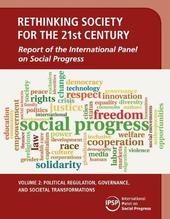
|
Rethinking Society for the 21st Century: Volume 2, Political Regulation, Governance, and Societal Transformations: Report of the
Paperback / softback
Main Details
| Title |
Rethinking Society for the 21st Century: Volume 2, Political Regulation, Governance, and Societal Transformations: Report of the
|
| Authors and Contributors |
Edited by IPSP
|
| Physical Properties |
| Format:Paperback / softback | | Pages:248 | | Dimensions(mm): Height 279,Width 217 |
|
| Category/Genre | Social and political philosophy
Political economy |
|---|
| ISBN/Barcode |
9781108436335
|
| Classifications | Dewey:306 |
|---|
| Audience | | Professional & Vocational | |
|---|
| Illustrations |
Worked examples or Exercises; 6 Tables, black and white; 1 Maps; 12 Line drawings, black and white
|
|
Publishing Details |
| Publisher |
Cambridge University Press
|
| Imprint |
Cambridge University Press
|
| Publication Date |
19 July 2018 |
| Publication Country |
United Kingdom
|
Description
This is the second of three volumes containing a report from the International Panel on Social Progress (IPSP). The IPSP is an independent association of top research scholars with the goal of assessing methods for improving the main institutions of modern societies. Written in accessible language by scholars across the social sciences and humanities, these volumes assess the achievements of world societies in past centuries, the current trends, the dangers that we are now facing, and the possible futures in the twenty-first century. It covers the main socio-economic, political, and cultural dimensions of social progress, global as well as regional issues, and the diversity of challenges and their interplay around the world. This particular volume covers topics such as democracy and the rule of law, violence and wars, international organizations and global governance, and media and communications.
Author Biography
The International Panel on Social Progress brings together more than 300 scholars from all disciplines of social sciences and the humanities, and from all continents. Since 2014, the mission of the Panel has been to gather expertise and disseminate knowledge on the perspectives for social progress around the world in the coming decades. The Panel is an independent initiative supported by more than thirty scientific or academic institutions and international foundations. With Amartya Sen as President, Nancy Fraser, Ravi Kanbur and Helga Nowotny as co-chairs of the Scientific Council, the Panel has been co-directed by Olivier Bouin and Marc Fleurbaey.
Reviews'This ambitious project with contributions from more than 300 scholars engages in true interdisciplinary dialogue to consider the evolution of society and possibilities for long-term social change. Professors who teach on globalization, political and economic sociology, social justice, and similar topics will find this to be a very useful tool.' Kumari Jawayardena, University of Colombo, Sri Lanka 'A masterful, innovative, and challenging work by a highly qualified team of social scientists, which provides a wide, coherent set of insightful and penetrating analyses of the long-term structural processes of twenty-first century society with special regard to change-makers. The three volumes share the global, interdisciplinary approach of the International Social Science Council and the perspective of 2016 World Social Science Report on 'Challenging Inequalities'. They will provide a fundamental contribution to the implementation of the sustainable development goals of UN 2030 Agenda.' Alberto Martinelli, President of the International Social Science Council 'The publication of the first Report of the International Panel on Social Progress is a significant intellectual event, both because of its hugely ambitious aim - of uniting the world's leading researchers from social sciences and the humanities to develop research-based, multi-disciplinary, non-partisan, action-guiding solutions to the central challenges of our time - and because it represents the completion of a mammoth effort in the service of this aim by a diverse set of 269 authors.' Alexander Raubo and Alex Voorhoeve, Economics and Philosophy
|